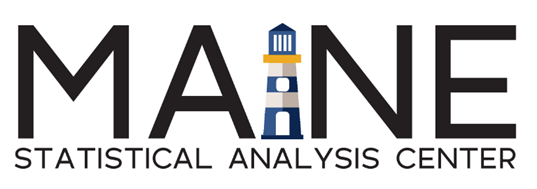About Maine SAC
The Maine Statistical Analysis Center (SAC) informs policy development and improvement of practice in Maine’s criminal and juvenile justice systems.

Our Story
In 1972, the Bureau of Justice Statistics (BJS) of the U.S. Department of Justice began providing limited funds to states to operate state statistical analysis centers (SACs). The purpose of each state SAC is to enhance the capacity to address criminal justice issues through applied research and data to estimate the implications and impacts of legislative and policy changes. SACs have a quantitative data focus, are nonpartisan, and strive to serve all branches of the criminal justice system, state government, and the general public. Through research projects, SACs create opportunities for deliberative civic engagement about justice policy and practice issues.
In 1999, pursuant to an Executive Order issued by Maine’s Governor, the Maine SAC was transferred from the Department of Corrections (DOC) to the University of Southern Maine’s Muskie School of Public Service. Currently, the Maine SAC resides within Muskie’s Catherine Cutler Institute for Health and Social Policy.
The Maine SAC team actively collaborates with numerous community-based and governmental agencies through conducting applied research, evaluating programs and initiatives, and providing consultation and organizational development services. Center staff strives to inform criminal and juvenile justice policy and practice by providing research, analysis, training, and technical assistance to help governmental agencies and community-based non-profits build capacity, use data to inform decision-making, and improve their performance.
Who We Are
Strategic Researchers
We apply appropriate interdisciplinary theories, frameworks, and evidence-based methods to conduct applied research and evaluate programs across the Maine justice system.
Problem Solvers
We engage policy makers, practitioners, non-profits, university colleagues, advocates, and the public in discussions about the implications of the research on policy and practice.
Connectors
We routinely play a convener role to help partners and stakeholders develop and generate new data sources and relevant information to pursue new research areas and issues.
Capacity builders
We help partners build their data capacity and increase their ability to use data to inform decision-making by establishing baseline and trended data and by standardizing new data flows.
Our Partners
Bureau of Justice Statistics (BJS)
Justice Research & Statistics Association (JRSA)
Maine Administrative Office of the Courts
Maine Department of Public Safety (DPS)
Maine Coalition Against Sexual Assault (MECASA)
Maine Coalition to End Domestic Violence (MCEDV)
Maine Office of the Attorney General
Maine Prosecutors’ Association (MPA)
National Institute of Justice (NIJ)
U.S. Attorney’s Office for the District of Maine

